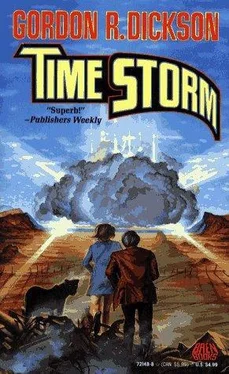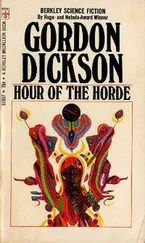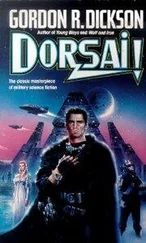Gordon Dickson - Time Storm
Здесь есть возможность читать онлайн «Gordon Dickson - Time Storm» весь текст электронной книги совершенно бесплатно (целиком полную версию без сокращений). В некоторых случаях можно слушать аудио, скачать через торрент в формате fb2 и присутствует краткое содержание. Год выпуска: 1992, ISBN: 1992, Издательство: Baen Books, Жанр: Фантастика и фэнтези, на английском языке. Описание произведения, (предисловие) а так же отзывы посетителей доступны на портале библиотеки ЛибКат.
- Название:Time Storm
- Автор:
- Издательство:Baen Books
- Жанр:
- Год:1992
- ISBN:0-671-72148-8
- Рейтинг книги:4 / 5. Голосов: 1
-
Избранное:Добавить в избранное
- Отзывы:
-
Ваша оценка:
- 80
- 1
- 2
- 3
- 4
- 5
Time Storm: краткое содержание, описание и аннотация
Предлагаем к чтению аннотацию, описание, краткое содержание или предисловие (зависит от того, что написал сам автор книги «Time Storm»). Если вы не нашли необходимую информацию о книге — напишите в комментариях, мы постараемся отыскать её.
Time Storm — читать онлайн бесплатно полную книгу (весь текст) целиком
Ниже представлен текст книги, разбитый по страницам. Система сохранения места последней прочитанной страницы, позволяет с удобством читать онлайн бесплатно книгу «Time Storm», без необходимости каждый раз заново искать на чём Вы остановились. Поставьте закладку, и сможете в любой момент перейти на страницу, на которой закончили чтение.
Интервал:
Закладка:
The view of the space before me, and the mighty engine in it, firmed. It grew clear and sharp once more.
“You’re still with us?” asked Dragger.
“Yes,” I said.
“Then there’s only one more step to take,” she said. “We’ll test you on the line. If you don’t succeed there, no one can help you. There’ll be no way out.”
“I’m ready.”
We went forward, toward the dyson sphere. Bodiless, we passed, like thought through its material shell, through the Klein bottle forces, down into the sea of radiation beyond any description that was the enclosed star. We approached the core that was the lens. Here, ordinary vision was not possible. But with the help of the information that had been pumped into me, the lens area rendered itself to my mental perception as an elliptical opening, dark purple against a wall of searing blue-white light. The energy stuff of the other universe pouring through that opening, was invisible, but sensible. It rendered itself as a force of such speed and pressure that it would have felt solid to the touch, if touch had existed in that place and it had been safe to use it upon that inflow.
Dragger led me almost to the lip of the lens.
“Do you feel anything?” she asked.
“Yes,” I said.
There was an odd counter force at work here. In spite of the tremendous outflow, I felt something like an undertow, as well, sucking us toward the lens. From where I felt it, it was nothing I could not resist; but I did not want to get closer.
“The downdraft,” said Dragger—the word she used in her communication form was not a precise or scientific term, but a casual one, almost a nickname for what I felt. “Does it bother you?”
“Yes,” I said; for the touch of its pull toward the open lens filled me with uneasiness. “I don’t know why.”
“It bothers us all,” she said, “and none of us is sure why. It’s no problem here, but out at operations point it becomes something you’ll need to watch out for. Now, meet the others working in this area.”
She spoke in turn to at least a couple of dozen other identities. My stored information recognized the symbols that were their personal identification as they answered her and spoke to me. Our conversation seemed to be mind to mind, here in the heart of the star. But actually, as I knew, we were talking together through the purely technological communications center of the space raft where my body and Porniarsk’s were. Most of those I spoke to had been at my full-dress argument session, previously. I was a little surprised to realize how many, there, had been temporal engineers; although, now that I thought of it, it was only logical that most of them should have been, since they would be the ones most concerned with me.
“Marc is going on line with us, out at operations point,” Dragger said. “If he works out, there, we’ve got another operator. Marc, are you ready to go?”
“Yes,” I said.
We withdrew from the lens, from the star and the engine. I had expected that I, at least, would be returning to my body on the raft, from which I would then go by ordinary, physical means to the operations point. But our identities instead started moving out along the energy projection from the engine, through interstellar space from the lesser Magellanic Cloud, where S Doradus was, toward our own galaxy.
“Your bodies will be sent back,” she said.
“Bodies?”
I woke to the fact that the identity of Porniarsk had just joined us.
“Porniarsk!” I said. “You’re going on the line, too?”
“Only as an observer, I’m afraid,” he answered. “As I think I’ve said to you in the past, I lack creativity. And a certain amount of creativity is required for direct work in temporal engineering. But in all other respects, I’m qualified; and our instructors thought you, at least, might find me useful to have with you.”
“Dragger?” I said.
“Yes?”
“Thank you.”
“The decision wasn’t mine,” she answered. “But I think it’s a good one. In spite of the fact you’ve passed all tests, Marc, you’re still very much an unknown quantity to us. Aside from whatever advantage it’ll be to you to have your friend with you, it’ll make the rest of us feel more secure to know that there’s an observer ready to tell us what happens if you do have trouble.”
“Enlightened selfishness,” I said.
“Of course.”
The trip we were now taking was a curious one. My newly educated memory told me it would have been thoroughly possible to make an immediate jump over the hundred and forty thousand light-years of distance from the neighborhood of S Doradus to our own galaxy. But Dragger evidently had a reason for taking me over the distance slowly, following the route of the energy being sent from the engine to the retreating matter of our galaxy; and now I began to understand what that reason was.
The energy from the tachyon universe was not projected in the form it was received, like a light beam aimed over a hundred and forty thousand light-years of distance. Instead, it was converted to a time force line, itself—an extension across space of form without mass, which would not be converted back into energy until it touched the solid material at its destination; and even then, it would be absorbed, rather than felt, as an outside force, by that material.
The form in which it was extended, however, was designed to increase in cross section until it was as wide as the galaxy to which it was being sent. Crudely, then, the energy flow could be represented as a funnel shape, with the small end at the lens of S Doradus and the width of the funnel increasing over the light-years of intergalactic distance between lens and galaxy, until the large end could contain our whole galaxy, including its spiral arms.
We were following, then, alongside this expanding funnel; and as we travelled, I became acutely conscious of its steady growth, and of a corresponding increase in the uneasiness I had felt about the downdraft. And this was ridiculous; because here, with the energy converted into a massless form, there was no downdraft to be felt. Dragger’s reason for moving Porniarsk and me this slowly along the route of the projected energy was becoming apparent.
I set my teeth against the reaction. It did not let itself be beaten down easily, because there was something very old about it; as if I had suddenly come face to face with a dire wolf out of prehistory, lurking among the shadows of some well-groomed, civilized park, at sunset. But it was only one more enemy to conquer; and gradually, as I faced it, it ceased to gain against me and then finally retreated. It was all but gone when Dragger spoke.
“How do you feel, Porniarsk?”
“I’m filled with wonder,” said Porniarsk.
“Outside of that, nothing?”
“Nothing,” he answered.
“And you, Marc?”
“Something,” I said. “But I think I’ve got it licked.”
She did not say any more until we came, at last, to the edges of our own galaxy and moved in among its stars, ourselves now within the mouth of the funnel.
“When possible,” she said, “we give the individual engineer a sector of work that includes their own home world. Your sector, Marc and Porniarsk, will include the world from which Obsidian brought you to us. Just now, there’s no work going on in it. For the moment, no changes in the temporal forces are appearing here, although the earlier forces aren’t balanced fully except in the local area of your world where you balanced them yourself, we understand, back before we have records of the storm. But there are going to be forces building up farther in toward the galaxy’s center in about nine months of your local time. You’ll have that many months to study your sector. Your bodies are being returned there and you’ll be able to spend some time in them. Obsidian’s returning them and bringing in the equipment you’ll need individually to work in this sector.”
Читать дальшеИнтервал:
Закладка:
Похожие книги на «Time Storm»
Представляем Вашему вниманию похожие книги на «Time Storm» списком для выбора. Мы отобрали схожую по названию и смыслу литературу в надежде предоставить читателям больше вариантов отыскать новые, интересные, ещё непрочитанные произведения.
Обсуждение, отзывы о книге «Time Storm» и просто собственные мнения читателей. Оставьте ваши комментарии, напишите, что Вы думаете о произведении, его смысле или главных героях. Укажите что конкретно понравилось, а что нет, и почему Вы так считаете.












